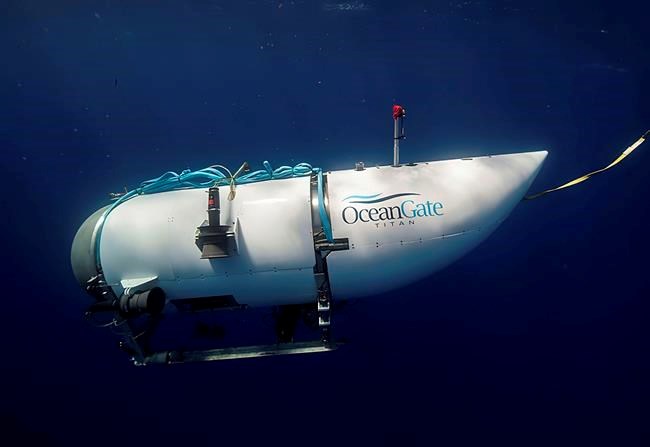HALIFAX — Underwater noises described as “banging” have been heard in an area of the Atlantic where a submersible disappeared three days ago near the wreck of the Titanic, search officials confirmed Wednesday.
However, U.S. Coast Guard Capt. Jamie Frederick cautioned that analysis of the sound by naval acoustics experts has so far proved inconclusive.
“We don’t know what they are, to be frank with you,” Frederick told reporters in Boston.
The noise, which was detected by a Canadian Aurora military patrol aircraft early Wednesday, was giving added impetus to the desperate search for five people aboard the 6.4-metre vessel named Titan.
Frederick said the search was continuing in the area where the noises were detected. “It’s my understanding that the (Aurora) heard some noises today as well,” he added.
Carl Hartsfield, of the Woods Hole Oceanographic Institution in Massachusetts, said there have been multiple reports of noises from the search area.
“Every one of those noises is being analyzed, tracked and looked at for patterns, " Hartsfield said. “The noises have been described as banging noises, but they (analysts) have to put the whole picture together in context and they have to eliminate potential man-made sources other than the Titan.”
He cautioned that there are a lot of vessels in the area, and they all make noise.
The development was a faint glimmer of hope as time became critical for the crew of the Titan, with less than a day's worth of air supply estimated to remain aboard the vehicle.
Frederick said five surface ships were combing the area Wednesday, including the Canadian Coast Guard Ship John Cabot, which has side-scanning sonar. Another five vessels were expected to assist the search over the next 24 to 48 hours, he said.
Two remotely operated vehicles were being used to a depth of 4,000 metres, said Frederick, with “several more” capable of submerging deeper expected to reach the search site by Thursday morning.
He said the hunt for the submersible remained a search and rescue mission. “We have to remain optimistic and hopeful,” said Frederick.
Sean Leet, CEO of Horizon Maritime Services, which owns the ship from which the Titan was launched, told reporters in St. John's that a second company-owned vessel left the port around 5 a.m. Wednesday carrying a U.S. Navy remotely operated vehicle. The ship, the Horizon Arctic, was expected to reach the Titanic site by Thursday morning.
“We are very aware of the time sensitivity around this mission,” said Leet, who called the equipment being deployed the “most capable in the world.”
“We have to hold out hope," he said. "There is still life support available on the submersible, and we will continue to hold out hope until the end.”
In Ottawa, Canada’s Fisheries Minister Joyce Murray told reporters she couldn’t speculate on the source of the noise.
”There have been sounds that have been picked up, and that just means that we will continue to double down and figure out where the submersible is and how it can be brought to the surface,” Murray said. “I think we have to retain hope as part of what we are doing as a human community to find the explorers and bring them to safety.”
Murray said the sonar capability aboard the John Cabot would give searchers “another tool to potentially find and bring back the submersible.”
The Titan lost contact with its surface launch ship Polar Prince during its descent Sunday in deep waters about 700 kilometres south of St. John’s, N.L. On board were Stockton Rush, the CEO of OceanGate Expeditions, which owns the submersible; British businessman Hamish Harding; Pakistani nationals Shahzada Dawood and his son Suleman; and French explorer and Titanic expert Paul-Henry Nargeolet.
OceanGate has led expeditions to the Titanic wreck site for three years. The luxury liner struck an iceberg and sank in 1912, killing all but about 700 of the roughly 2,200 passengers and crew.
This report by The Canadian Press was first published June 21, 2023.
— With files from Sarah Smellie in St. John's, N.L.
Keith Doucette, The Canadian Press



